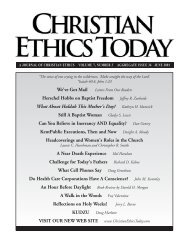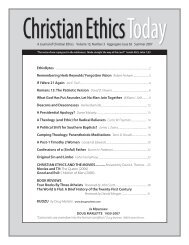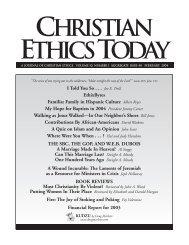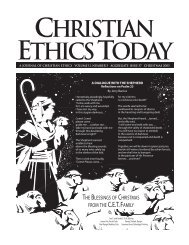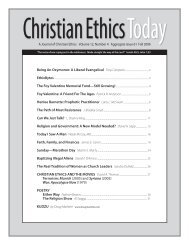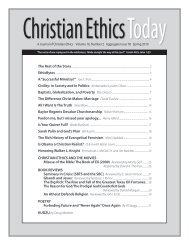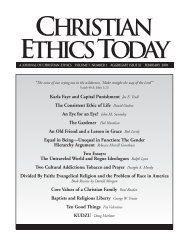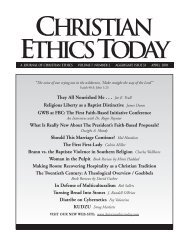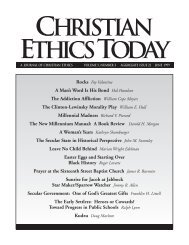Issue 052 PDF Version - Christian Ethics Today
Issue 052 PDF Version - Christian Ethics Today
Issue 052 PDF Version - Christian Ethics Today
You also want an ePaper? Increase the reach of your titles
YUMPU automatically turns print PDFs into web optimized ePapers that Google loves.
lift dumpsters over the truck cab and empty them into a hopper<br />
behind the driver’s head). The trucks have internal compactors<br />
and when full will weigh close to thirty tons. The fuel<br />
cost for pushing an empty front–end loader down the street<br />
is about one-fifth of the cost of pushing a full one down the<br />
street. Thus routes are designed to begin at the furthest point<br />
from the landfill and work toward the landfill. Part of the<br />
driver’s duty is to make certain that the fewest miles are driven<br />
when fully loaded.<br />
For years the drivers, like all other employees in the refuse<br />
division, were paid on an hourly basis,. The hourly rate was<br />
quite high, intentionally set to combat a specific challenge. It<br />
is difficult to maneuver a large truck in a congested apartment<br />
complex parking lot without doing damage. The solution<br />
was to double their pay, with the absolute warning that<br />
they would be terminated if they had even one accident. The<br />
accidents ceased overnight. The drivers became very careful<br />
because they liked the higher pay.<br />
A new Chief Operations Officer, who had an MBA and<br />
many new ideas, made a study of the comparative costs for<br />
each dumpster lift. He discovered that some of the drivers<br />
were on the clock for over ten hours, while other drivers (due<br />
to various skills), could run their route in six hours. Thus the<br />
company was paying a premium to inefficient drivers.<br />
The proposed solution was to put the drivers back on<br />
minimum wage and provide them additional compensation<br />
for each dumpster they picked up. The slow drivers rebelled<br />
and the speedy drivers thought it was a great idea. The end<br />
result was that the faster drivers requested additional dumpsters<br />
be added to their routes, which reduced the number of<br />
routes by 20%. Since front–end loader garbage trucks each<br />
cost about $150,000, the reduction in the number of needed<br />
trucks resulted in a significant savings.<br />
What was the ethical challenge here? Most of the slower<br />
drivers were older and had relied on their overtime income to<br />
keep children in college, make payments on a home, or meet<br />
other basic needs. By moving them to a different pay schedule,<br />
which management felt was fair to the company, the driver’s<br />
were impacted significantly.<br />
One corporate ethics text described the owners’ ethical<br />
dilemma: “To separate from ‘personal ethics’ any<br />
autonomous area of ‘business life’ where God does not rule<br />
22 • CHRISTMAS 2004 • CHRISTIAN ETHICS TODAY<br />
would be unthinkable in biblical theology.” 22 The authors of<br />
this text offered corporate management some basic principles:<br />
1. God’s law demands justice and truth; 2. There is an<br />
interrelatedness of all things—nothing is isolated from its<br />
effects on others; and 3. A believer must inject biblical ethics<br />
into corporate decision-making.<br />
Case three happened at a point in the company history<br />
when it was not struggling financially. If the situation had<br />
occurred early in the company history, when it was burdened<br />
by significant debt payments, there probably would have<br />
been little sympathy for the older drivers and their loss of<br />
income.<br />
<strong>Christian</strong> ethical principles that apply to the ethical treatment<br />
of the older drivers are found in Stephen Mott’s biblical<br />
ethics textbook: 23<br />
Our ethical behavior is to correspond to what God has<br />
enabled us to be by adoption and grace based on God’s<br />
historical, once–for–all act in Christ’s death and resurrection.<br />
Be (imperative) what you are (indicative) in Christ;<br />
thus we are given an ‘indicative and imperative’ ethical<br />
appeal. We could call it ‘grace and ethics.’ 24<br />
One basic plank of <strong>Christian</strong> ethics is that Love transcends<br />
Justice. Justice can be an instrument of love.<br />
Justice functions to ensure that in our common life we<br />
are for our fellow human beings, which is, indeed, the<br />
meaning of love. (54).<br />
Wherever there is basic human need, we are obliged to<br />
help to the extent of our ability and opportunity. (77).<br />
We are not faced with a dualistic ethic: there is not one<br />
ethical standard for private and intimate life and a different<br />
one for commercial and political life. The same criteria<br />
of judgment apply to both situations, but the latter is<br />
more complex. (184).<br />
Case three presents a classic case of conflict between<br />
doing what is best for the company, which would reduce the<br />
pay of the older drivers in accordance with their production,<br />
or doing what is best for the drivers by permitting them to<br />
maintain the same income for the same work they had been<br />
doing for years. An analysis of the problem might indicate<br />
different outcomes, depending on the person having to make<br />
the decision.<br />
A supervisor with a duty to the company most probably



